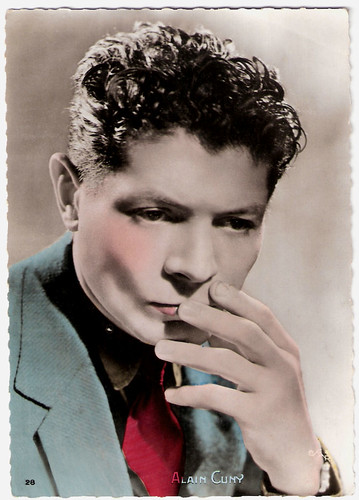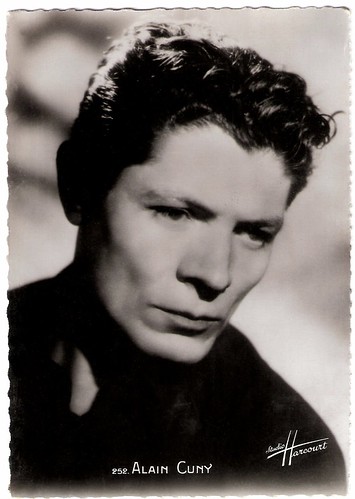French actor Alain Cuny (1908-1994) worked in both France and Italy. Among his most notable films are Les Visiteurs du soir (1942), Les Amants/The Lovers (1958), La dolce vita (1960) and Satyricon (1969).

French postcard by Editions P.I., Paris, no. 154. Photo: Carlet Ainé.

French postcard by E.C., Paris, no. 58. Photo: Aldò Graziati / Discina. Publicity still for Les visiteurs du soir (Marcel Carné, 1942).

French postcard by Editions P.I., Paris, no. 28. Photo: Star.
Alain Cuny was born René Xavier Marie in Saint-Malo, Brittany, in 1908. There, he attended Institut Libre de Saint-Lô and the Collège Locroy-Saint-León. Then he studied architecture at École Nationale Supérieure des Beaux-Arts in Paris and studied drama with Charles Dullin.
He entered the film industry as a costume and set designer for such famous directors as Alberto Cavalcanti, Jacques Feyder, and Jean Renoir. With Cavalcanti, he also worked as an assistant director. At the end of the 1930s, Cuny started acting on stage. He made his film debut in an insignificant role in Remorques/Stormy Waters (Jean Grémillon, 1941) starring Jean Gabin.
The following year he became instantly famous with his lively performance as the strolling minstrel and Devil's assistant, Gilles, in Les Visiteurs du Soir/The Devil's Envoys (Marcel Carné, 1942) opposite Arletty. Another popular role was Hervé in the atmospheric tale of the supernatural Le Baron fantôme/The Phantom Baron (Serge de Poligny, 1943). Cuny also collaborated on the script. Opposite Jean Cocteau, as the Baron, Cuny, the Baron's son and heir, created an unusual version of the romantic hero, reflecting the film's fantastic and legendary quality.
During the war, he was also active in the theatre. Karl Tabery at Film Reference: “Cuny played increasingly realistic roles, and his performances became deeper and more psychologically complex. This gradual change was probably due to the influence of his theatrical work, especially after he began to appear at the Théâtre National Populaire under Jean Vilar. Cuny's first major stage success came at the 1947 Avignon Festival in Paul Claudel's 'L'Histoire de Tobie et de Sarah', and he also appeared in Vilar's subsequent production of 'Macbeth'.” In the early 1950s, Cuny began starring in Italian films in addition to French films.
Among his Italian films are Il Cristo proibito/Forbidden Christ (Curzio Malaparte, 1951) starring Raf Vallone, and La signora senza camelie/The Lady without Camelias (Michelangelo Antonioni, 1953) featuring Lucia Bosé. Among his other notable roles of that decade are the villainous cleric Claude Frollo in Notre Dame de Paris/The Hunchback of Notre Dame (Jean Delannoy, 1956) co-starring Gina Lollobrigida and Anthony Quinn, and the husband of Jeanne Moreau in the Nouvelle Vague classic Les Amants/The Lovers (Louis Malle, 1958).

French postcard by Editions E.C., Paris, no. 13. Photo: Carlet Ainé.

French postcard by S.E.R.P., Paris, no. 252. Photo: Studio Harcourt.

French postcard by Editions P.I., Paris, no. 28. Photo: Star.
Alain Cuny got international recognition for his next role as the conflicted philosophising author Steiner in La dolce vita (Federico Fellini, 1960) starring Marcello Mastroianni. Cuny presented Steiner as a seemingly quiet and even-tempered man, living happily with a beautiful and intelligent wife, who yields to a sudden, mysterious attack of folly and commits suicide. A huge worldwide success, La Dolce Vita won several awards, including a New York Film Critics Circle award for Best Foreign Film and the Palme d'Or at the Cannes Film Festival.
Cuny later also appeared in Fellini’s Satyricon (Federico Fellini, 1969), a free adaptation of Petronius' famous farcical chronicle of ancient Roman life starring Martin Potter and Hiram Keller. He also worked with such noted directors as Mauro Bolognini at La corruzione/Corruption (1963), Marcel Ophüls at the comedy Peau de banane/Banana Peel (1963) and Luis Buñuel at La Voie Lactée/The Milky Way (1969).
Later in his career, Cuny had a role in Emmanuelle (Just Jaeckin, 1974). This was the first and original Emmanuelle film in a highly successful series of soft-core erotic films starring Sylvia Kristel. The worldwide gross of the film was an estimated 100 million dollars. Also in 1974 he played Sitting Bull in the absurdist Western Touche pas la femme blanche/Don't Touch the White Woman (Marco Ferreri, 1974) starring Catherine Deneuve.
He often worked with director Francesco Rosi such as on the political thriller Cadaveri eccellenti/Illustrious Corpses (1976) with Lino Ventura, and the historical war drama Cristo si è fermato a Eboli/Christ Stopped at Eboli (1979) with Gian Maria Volonté. Cuny played an old Mafioso in Godard’s Détective/Detective (Jean-Luc Godard, 1987).
One of his last roles was in the biography Camille Claudel (Bruno Nuytten, 1988) as Louis-Prosper Claudel, the father of the film's tragic heroine (Isabelle Adjani). In 1991 he directed his first film, the romantic drama L'annonce faite à Marie/The Annunciation of Marie (1991). Alain Cuny died in 1994 in Paris. He was 85. During his life, he befriended women such as Hafida Elalama, and many other models and actresses. Since 1962, he had been married to Marie-Blanche Guidicelli.
Original French trailer for Les Visiteurs du soir/The Devil's Envoys (1942). Source: Joel Spiggott (YouTube).
Original Italian trailer for La dolce vita (1960). Source: Pulp59 (YouTube).
US trailer for Emmanuelle (1974). Source: Robatsea2009 (YouTube).
Sources: Karel Tabery (Filmreference.com), Hal Erickson (AllMovie), Wikipedia, and IMDb.
This post was last updated on 11 November 2023.

French postcard by Editions P.I., Paris, no. 154. Photo: Carlet Ainé.

French postcard by E.C., Paris, no. 58. Photo: Aldò Graziati / Discina. Publicity still for Les visiteurs du soir (Marcel Carné, 1942).

French postcard by Editions P.I., Paris, no. 28. Photo: Star.
Devil's assistant
Alain Cuny was born René Xavier Marie in Saint-Malo, Brittany, in 1908. There, he attended Institut Libre de Saint-Lô and the Collège Locroy-Saint-León. Then he studied architecture at École Nationale Supérieure des Beaux-Arts in Paris and studied drama with Charles Dullin.
He entered the film industry as a costume and set designer for such famous directors as Alberto Cavalcanti, Jacques Feyder, and Jean Renoir. With Cavalcanti, he also worked as an assistant director. At the end of the 1930s, Cuny started acting on stage. He made his film debut in an insignificant role in Remorques/Stormy Waters (Jean Grémillon, 1941) starring Jean Gabin.
The following year he became instantly famous with his lively performance as the strolling minstrel and Devil's assistant, Gilles, in Les Visiteurs du Soir/The Devil's Envoys (Marcel Carné, 1942) opposite Arletty. Another popular role was Hervé in the atmospheric tale of the supernatural Le Baron fantôme/The Phantom Baron (Serge de Poligny, 1943). Cuny also collaborated on the script. Opposite Jean Cocteau, as the Baron, Cuny, the Baron's son and heir, created an unusual version of the romantic hero, reflecting the film's fantastic and legendary quality.
During the war, he was also active in the theatre. Karl Tabery at Film Reference: “Cuny played increasingly realistic roles, and his performances became deeper and more psychologically complex. This gradual change was probably due to the influence of his theatrical work, especially after he began to appear at the Théâtre National Populaire under Jean Vilar. Cuny's first major stage success came at the 1947 Avignon Festival in Paul Claudel's 'L'Histoire de Tobie et de Sarah', and he also appeared in Vilar's subsequent production of 'Macbeth'.” In the early 1950s, Cuny began starring in Italian films in addition to French films.
Among his Italian films are Il Cristo proibito/Forbidden Christ (Curzio Malaparte, 1951) starring Raf Vallone, and La signora senza camelie/The Lady without Camelias (Michelangelo Antonioni, 1953) featuring Lucia Bosé. Among his other notable roles of that decade are the villainous cleric Claude Frollo in Notre Dame de Paris/The Hunchback of Notre Dame (Jean Delannoy, 1956) co-starring Gina Lollobrigida and Anthony Quinn, and the husband of Jeanne Moreau in the Nouvelle Vague classic Les Amants/The Lovers (Louis Malle, 1958).

French postcard by Editions E.C., Paris, no. 13. Photo: Carlet Ainé.

French postcard by S.E.R.P., Paris, no. 252. Photo: Studio Harcourt.

French postcard by Editions P.I., Paris, no. 28. Photo: Star.
Seemingly quiet and even-tempered
Alain Cuny got international recognition for his next role as the conflicted philosophising author Steiner in La dolce vita (Federico Fellini, 1960) starring Marcello Mastroianni. Cuny presented Steiner as a seemingly quiet and even-tempered man, living happily with a beautiful and intelligent wife, who yields to a sudden, mysterious attack of folly and commits suicide. A huge worldwide success, La Dolce Vita won several awards, including a New York Film Critics Circle award for Best Foreign Film and the Palme d'Or at the Cannes Film Festival.
Cuny later also appeared in Fellini’s Satyricon (Federico Fellini, 1969), a free adaptation of Petronius' famous farcical chronicle of ancient Roman life starring Martin Potter and Hiram Keller. He also worked with such noted directors as Mauro Bolognini at La corruzione/Corruption (1963), Marcel Ophüls at the comedy Peau de banane/Banana Peel (1963) and Luis Buñuel at La Voie Lactée/The Milky Way (1969).
Later in his career, Cuny had a role in Emmanuelle (Just Jaeckin, 1974). This was the first and original Emmanuelle film in a highly successful series of soft-core erotic films starring Sylvia Kristel. The worldwide gross of the film was an estimated 100 million dollars. Also in 1974 he played Sitting Bull in the absurdist Western Touche pas la femme blanche/Don't Touch the White Woman (Marco Ferreri, 1974) starring Catherine Deneuve.
He often worked with director Francesco Rosi such as on the political thriller Cadaveri eccellenti/Illustrious Corpses (1976) with Lino Ventura, and the historical war drama Cristo si è fermato a Eboli/Christ Stopped at Eboli (1979) with Gian Maria Volonté. Cuny played an old Mafioso in Godard’s Détective/Detective (Jean-Luc Godard, 1987).
One of his last roles was in the biography Camille Claudel (Bruno Nuytten, 1988) as Louis-Prosper Claudel, the father of the film's tragic heroine (Isabelle Adjani). In 1991 he directed his first film, the romantic drama L'annonce faite à Marie/The Annunciation of Marie (1991). Alain Cuny died in 1994 in Paris. He was 85. During his life, he befriended women such as Hafida Elalama, and many other models and actresses. Since 1962, he had been married to Marie-Blanche Guidicelli.
Original French trailer for Les Visiteurs du soir/The Devil's Envoys (1942). Source: Joel Spiggott (YouTube).
Original Italian trailer for La dolce vita (1960). Source: Pulp59 (YouTube).
US trailer for Emmanuelle (1974). Source: Robatsea2009 (YouTube).
Sources: Karel Tabery (Filmreference.com), Hal Erickson (AllMovie), Wikipedia, and IMDb.
This post was last updated on 11 November 2023.
No comments:
Post a Comment